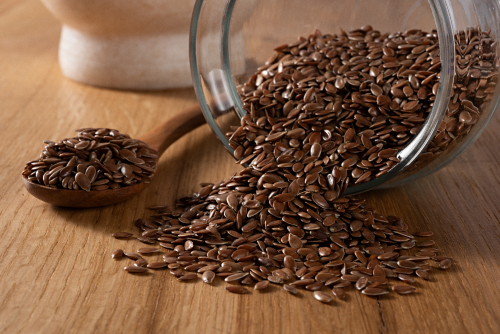Health Benefits of Flaxseed

Flaxseed, flax meal, ground flaxseed … what’s the difference? Flaxseed, when eaten whole, is not fully digested by our digestive tract and may pass through whole. This means our body is not getting the healthful benefits contained within the flaxseed.
Milled = Ground = Flax Meal
To get the healthful benefits inside the flaxseed, it must be ground or milled, which is called flax meal.
It’s best to buy whole flaxseed and grind it as you use it. Store whole seeds in the refrigerator or freezer in a tightly sealed container. Flaxseed can easily be ground with a coffee bean grinder or in a blender. It’s important to store flax meal in an airtight, non-transparent container, as exposure to air can cause spoilage.1
Health Benefits of Flaxseed
Numerous studies have shown that flaxseed is good for our health, particularly when it comes to heart disease and cancer. Some positive effects have also been found in diabetes and gastrointestinal health; however, more studies are needed.
Flaxseed contains:
- Alpha linolenic acid (a type of omega-3 fat): shown to have powerful protective heart effects2
- High amounts of dietary fiber: may help relieve constipation and lower blood glucose in people with type 2 diabetes3 as well as lower LDL cholesterol2
- Lignans: digested by intestinal bacteria into compounds which may have protective properties in certain types of cancers; however, more studies are needed3
How to Incorporate Flaxseed into Your Diet
Always talk with your doctor before starting any supplement. When adding flax meal, start slowly, adding 1 teaspoon to your diet and checking for any adverse effects. Each day, increase by 1 teaspoon if there are no adverse effects and continue to increase until you reach 1-2 tablespoon a day.1 One tablespoon of ground flaxseed contains 37 calories, 2.4 grams of polyunsaturated fat (includes the omega-3 fatty acids), 0.5 gram of monounsaturated fat and 2.2 grams of dietary fiber.5
Add it to:
- Baked good recipes (muffins, cookies, quick breads)
- Hot or cold cereals
- Yogurt, salad or smoothies
Check out these flaxseed recipes on DaVita.com:
References:
- https://www.mayoclinichealthsystem.org/hometown-health/speaking-of-health/flaxseed-is-nutritionally-powerful accessed 8/28/22
- https://www.ncbi.nlm.nih.gov/pmc/articles/PMC6567199/ accessed 8/20/22
- https://www.nccih.nih.gov/health/flaxseed-and-flaxseed-oil accessed 8/20/22
- https://pubmed.ncbi.nlm.nih.gov/17357545/ accessed 8/21/22
- https://fdc.nal.usda.gov/fdc-app.html#/food-details/2262075/nutrients accessed 8/29/22
Additional Kidney Diet Resources
Visit DaVita.com and explore these diet and nutrition resources:
DaVita Kidney-Friendly Recipes
This article is for informational purposes only and is not a substitute for medical advice or treatment. Consult your physician and dietitian regarding your specific diagnosis, treatment, diet and health questions.

Recent Comments